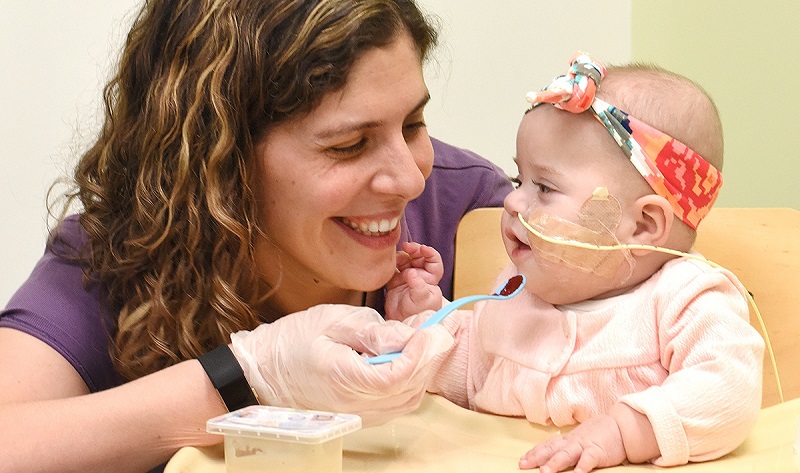Long Island's Selection for Food Therapist Solutions
Wiki Article
Browsing the Path to Effective Feeding: Innovative Techniques and Treatments for Efficient Feeding Therapy
Are you battling to discover effective methods and treatments for successful feeding treatment? Look no more. This article will certainly guide you through the path to success, giving innovative strategies to assess feeding difficulties and established attainable goals. With evidence-based methods, you'll learn how to attend to sensory processing problems and make use of assistive technology and adaptive equipment. Plus, we'll reveal you the value of teaming up with households and caretakers for optimal feeding results. Prepare to navigate the path to effective feeding!Assessing Feeding Obstacles and Identifying Goals
You ought to begin by evaluating your kid's feeding challenges and recognizing particular objectives for their treatment. It's vital to interact these objectives with your child's feeding therapist so they can customize the therapy sessions to attend to these specific difficulties. By evaluating your child's feeding difficulties and establishing objectives, you are taking the initial action in the direction of helping them establish effective feeding skills.Carrying Out Evidence-Based Methods for Feeding Therapy
Applying evidence-based approaches for feeding therapy can lead to favorable end results for kids. You are guaranteeing that the interventions used are supported by clinical study and have actually been verified reliable when you include these strategies into your child's treatment plan. This method enhances the likelihood of success and assists attend to the certain feeding difficulties your kid may be experiencing.By following evidence-based techniques, you can offer your child with the very best possible treatment and assistance. These methods might consist of making use of a selection of sensory experiences throughout mealtimes, such as exploring various appearances and tastes, to motivate approval of brand-new foods. Furthermore, applying therapy techniques can assist resolve particular consuming routines and advertise healthier consuming patterns.
One more essential aspect of evidence-based feeding therapy is entailing the household in the treatment process. By supplying education and assistance to parents and caregivers, they can play an active duty in assisting their child overcome feeding obstacles. This collective approach improves the effectiveness of treatment and advertises long-term favorable adjustments in your child's eating habits.

Addressing Sensory Processing Issues in Feeding Therapy
Attending to sensory processing problems in feeding treatment can be tough, however it is essential for promoting a favorable consuming experience for kids. When you run into a kid with sensory handling problems during mealtime, it is essential to understand that their reactions to particular appearances, preferences, scents, or even noises are not intentional (food therapist farmingdale). By recognizing and dealing with these concerns, you can help create a helpful environment that encourages healthy and balanced consuming routines
This technique allows the kid to become familiar with the food and its sensory homes at their very own speed. Additionally, supplying a selection of flavors and structures can aid desensitize their sensory system and expand their food preferences.
Involving the child in sensory play tasks can additionally be helpful. Encourage them to check out various structures, such as squishing, squeezing, or touching numerous food items. This can assist normalize sensory input and reduce aversions to particular textures.
One more essential facet is offering a structured and calm eating setting. Minimize distractions, such as loud sounds or bright lights, which can overwhelm their senses and impede their capacity to concentrate on eating. Developing a foreseeable routine and utilizing aesthetic schedules can also aid the child feel even more safe and in control during mealtime.

Making Use Of Assistive Innovation and Adaptive Devices
Making use of assistive innovation and adaptive equipment can substantially improve the feeding experience for kids with sensory processing difficulties. Mealtime can be frustrating and tough when you have problem with sensory processing. With the right devices, you can make it a much more enjoyable and effective experience.One alternative is utilizing specialized plates and utensils made to accommodate your demands. These utensils might have textured manages or a bigger look here grip, making them easier to manipulate and hold. Plates with split areas can aid divide different foods and stop them from touching, which can be a source of pain for some kids.
Along with specialized plates and tools, there are likewise assistive tools that can be used during feeding. As an example, a heavy vest or lap pad can supply deep pressure input, assisting to relax and regulate your sensory system. A shaking tooth brush or chewable fashion jewelry can give dental sensory excitement, making the act of consuming extra delightful.
Technology can additionally contribute in improving the feeding experience. There are tools and applications readily available that can provide acoustic or visual hints, such as timers or prompts, to help you stay concentrated and arranged throughout mealtime.
Working Together With Households and Caregivers for Effective Feeding Outcomes
When collaborating with caregivers and family members, you can interact to create a helpful and caring environment for successful feeding results. By entailing families and caregivers in the feeding therapy process, you can acquire important insights into the child's feeding obstacles, choices, and routines. food therapist long island. This partnership permits an all natural strategy to feeding treatment, resolving not just the physical facets however also the emotional and psychological variables that might impact a child's feeding capacitiesOne secret element of teaming up with caretakers and households is supplying education and training. By outfitting them with understanding and skills, they can proactively take part in the feeding therapy procedure and support the youngster's development outside of treatment sessions. This can include teaching them feeding strategies, strategies for taking care of nourishment behaviors, and recognizing the significance of uniformity and routine in establishing healthy eating habits.
Moreover, including family members and caregivers in setting goal and treatment planning ensures that their point of views and goals for the kid are taken into consideration. By interacting, you can develop achievable and practical goals that line up with the family members's values and priorities - feeding therapy farmingdale ny. This joint approach fosters a sense of read review possession and empowerment, creating a strong structure for successful feeding end results
In addition, regular and open communication with households and caretakers is necessary for reliable cooperation. By preserving recurring discussion, you can address problems, offer assistance, and make needed changes to the feeding treatment plan as required. This interaction additionally allows for sharing progress updates, commemorating success, and identifying any challenges or barriers that may develop.

Conclusion
Congratulations on completing this write-up on browsing the path to effective feeding! You have checked out various approaches and treatments for effective feeding treatment, such as examining difficulties, implementing evidence-based methods, resolving sensory processing issues, and utilizing assistive technology. By teaming up with families and caretakers, you can guarantee successful feeding outcomes. Keep in mind to constantly remain innovative and aggressive in your method to feeding therapy. Maintain up the original site magnum opus!It's important to communicate these objectives with your child's feeding specialist so they can tailor the therapy sessions to deal with these specific obstacles.Executing evidence-based methods for feeding treatment can lead to favorable end results for kids.Resolving sensory processing issues in feeding therapy can be challenging, yet it is important for promoting a favorable eating experience for kids. By including households and caretakers in the feeding treatment process, you can get beneficial insights right into the youngster's feeding behaviors, difficulties, and choices. By equipping them with expertise and skills, they can actively participate in the feeding treatment procedure and sustain the kid's progression outside of treatment sessions.
Report this wiki page